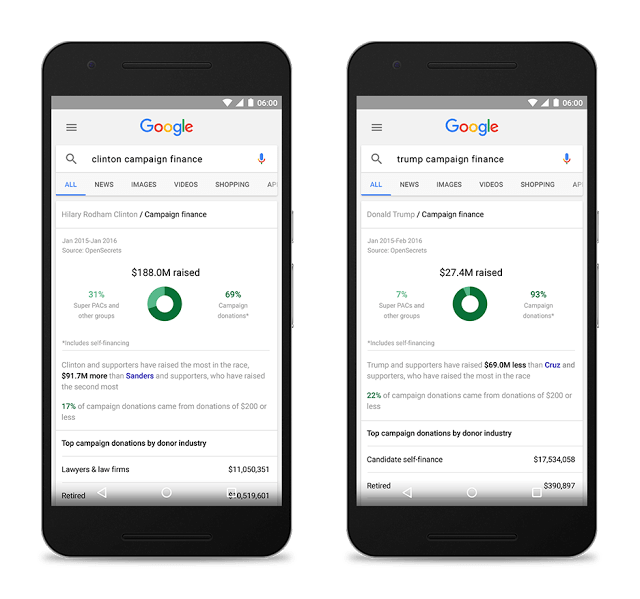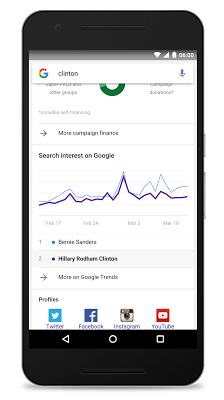
Just in time for “Mega Tuesday,” Google has rolled out new features to Google Search that will allow you to better track the primaries and learn more about the candidates. One new addition provides easy-to-understand campaign finance information, so you can see things like which percentage of funds come from SuperPACs versus individuals, or which industries are more heavily backing a candidate, for example. Another feature brings search trends related to the candidates and makes it available more directly through Google Search. This lets you see how interest in a candidate and his or her opponents has changed over time.
The launch of these new items follows a similar move by Google to add more election-related features to its search engine, which debuted last month. The company then rolled out tools that offered easy access to a candidate’s policies on topics like the economy, gun control, immigration, education and more, among other things.
The idea behind these efforts, explains Google, is to make it simpler to find information on topics that can still be hard to research with a simple Google Search. However, because Google tends to be users’ first stop when they’re looking to educate themselves on the candidates, Google plays a large role in today’s election cycle.
Of course, it’s critical that Google presents unbiased information so people can draw their own conclusions. To that end, the company worked with data source provider the Center for Responsive Politics to provide searchers with trusted campaign finance information.
This feature is triggered when you perform a search like donald trump or clinton campaign finance, for example, and will highlight what percentage of funds come from which sources, what the top campaign donations are by industry, how much came from SuperPACs and more.

The new trending feature, meanwhile, simply offers a way to see search interest in the candidates as it changes over time. This is perhaps of more interest to news media organizations that are tracking how various events — like speeches, debates and other election activity — can trigger spikes in search queries on Google for a particular candidate. To be clear, this is only about search activity — it doesn’t get into sentiment tracking, which would tell you how people currently “feel” about a candidate.
This feature is not really new, however — you could always go to the Google Trends website to track a topic like this — but now it’s being made available directly in Google Search for the sake of convenience. Other organizations have tapped into this data as well — as the AP has with its “Election Buzz” tool that combines Google and Twitter data to provide insights into election trends and topics.
Both of these new additions are live today on Google Search on web and mobile.


Comments are closed.